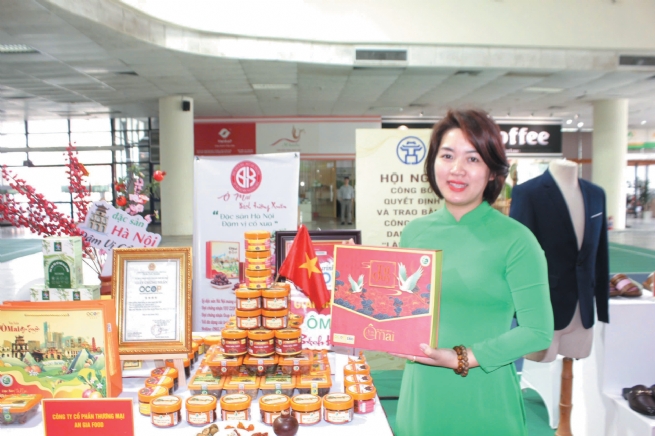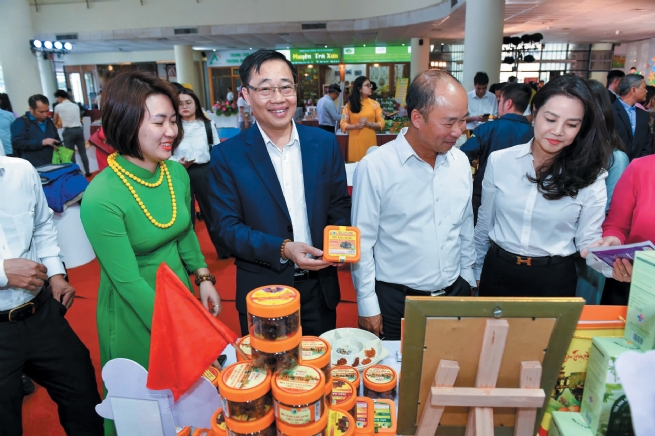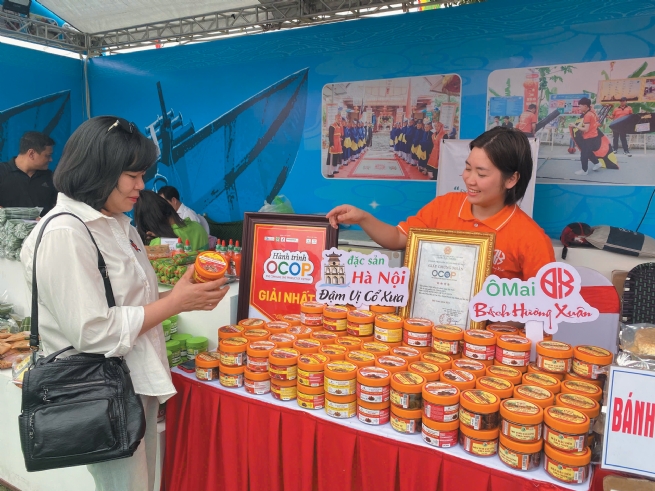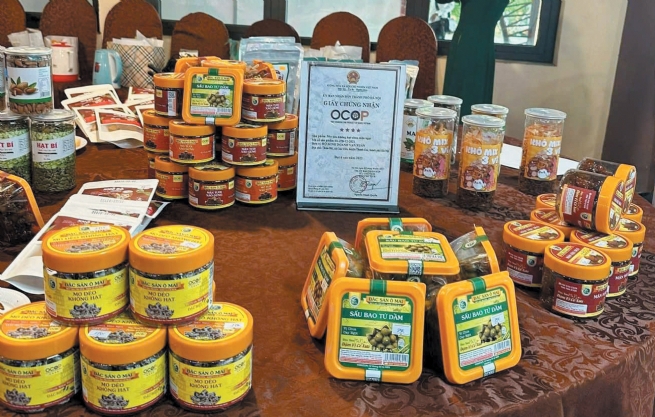Thanh Oai district, renowned for its lasting traditional craft villages, has a quiet but inspiring brand called Bach Huong Xuan Preserved Fruits, the result of a journey of safeguarding and elevating a beloved local specialty. From a small household-based producer in Cao Vien commune, Bach Huong Xuan preserved fruits have gradually conquered the market, earned the highly regarded 4-star OCOP certification, and become a source of pride for the local community.

Bach Huong Xuan preserved fruits have earned a 4-star OCOP certification and become a local pride
Inspired by the love for homeland delicacies
Nguyen Thi Le, the woman behind the brand, was born and raised in Cao Vien commune. More than just inheriting the family trade, she has carried with her an ambitious vision of affirming the value of traditional products. Since her childhood, she helped her grandfather and parents select apricots and plums, soak them in sugar, simmer with ginger and carefully pack them into small bags for sale in local markets. Those childhood experiences sowed in her a special love for this humble yet typical treat of northern Vietnam.
"Preserved fruits are not just snacks but they are a cultural expression, a taste of childhood for many people. I want to sustain it and share it with others in a more modern and professional way,” Le said.
Starting from a small kitchen
In the early 2000s, as consumer interest in artisanal foods started to grow, she decided to develop her family’s preserved fruit facility into a more structured production model. The name “Bach Huong Xuan” not only means “a hundred years of preserving the flavor and fragrance of spring” in the literal sense, but also luck, prosperity and sustainability for the brand.
Unlike industrial products, Bach Huong Xuan preserved fruits are still made the traditional way: Manually selecting every ripe apricot and plum from well-known growing regions like Moc Chau and Huong Pagoda, marinating them with rock sugar and fresh ginger, then sun-drying or lightly baking to retain their natural essence. As a result, products keep a delicately sweet and sour taste, free of overly sugary notes and artificial colors - really a true “homemade” flavor.
However, Le understood that traditional experience alone wasn’t enough to grow a business. She began learning about food safety standards, investing in processing and packaging equipment, and building brand identity in a methodical and professional way.


The facility’s preserved fruits retain their unique charm, crafted with care and passion
Lifting rural preserved fruits to OCOP standards
In 2020, when Hanoi launched the OCOP Program (One Commune One Product), she saw it as a golden opportunity to lift up her products. With support from local authorities and the Hanoi Coordination Office for New Rural Development, she registered to join the program and kicked off the process of standardizing every production stage to meet OCOP requirements.
This journey was not easy. She had to build traceability systems, ensure the transparency of production processes, improve packaging and labeling, and complete detailed technical documents. At the same time, she attended training courses and trade fairs to connect with domestic and international distributors.
To date, 10 of her products have been awarded the OCOP 4-star certification, namely Special sweet and sour wampee jam, Seedless ginger-plum preserves, Fresh plums with ginger, Sweet and sour fresh plums with ginger, Chewy sweet and sour black plums, Sweet and sour gingered apricots, Chewy seedless apricots, Special sweet and sour apricots, Sweet, salty and sour apricots, and Spicy, salty and sour apricots. This recognition is not only a point of personal pride for her, but a significant milestone that opens new doors for this local brand.
Keeping the countryside taste, entering major markets
From a seasonal product, Bach Huong Xuan preserved fruits have now become a year-round food, distributed across Vietnam, from specialty stores in Hanoi and Ho Chi Minh City to supermarkets and online platforms. Notably, Bach Huong Xuan products have also become popular souvenirs among international tourists and overseas Vietnamese who bring the product all over the world.
Although she already expanded her business, Le remains steadfast in her belief that “quality is more important than quantity.” “I believe that only sincerity and meticulousness in every product can earn lasting trust of customers,” she said.
To meet the demand for gifts, she has also innovatively designed elegant packaging that still retains the spirit of Vietnamese Tet or Lunar New Year. Thus, each piece of preserved fruit is more than a snack, but it becomes a cultural ambassador of Vietnam to the world.

Spreading traditional values
Beyond business, Le is also committed to sharing her entrepreneurial experiences, supporting other small producers in her commune to improve quality, participate in OCOP Program and access wider markets. “If every commune can develop a unique product in a professional way, then the countryside can thrive on their own inherent strengths,” she said with hopeful eyes.
The story of Le and her Bach Huong Xuan preserved fruits is more than just the entrepreneurial journey of a rural woman, but it is a vivid testament to the potential of locally distinctive products. It shows that, with the true love for the homeland, determination and aspiration for a better outcome, even the simplest thing can make inroads into big markets and leave lasting impressions.
In a sea of modern gift options, Bach Huong Xuan preserved fruits retain their unique identity: simple, rustic but filled with the heart and soul of the makers. It is the tartness of apricots, the heat of ginger, the sweetness of sugar, and the burning passion of hometown love.
From Cao Vien commune, Bach Huong Xuan preserved fruits have moved beyond communal boundaries to become a typical example of Hanoi’s OCOP products. More importantly, it has become a beautiful symbol of the harmony between tradition and innovation, between the old soul and today’s aspiration.
The journey of Bach Huong Xuan proves that traditional products can survive well in the new context if they can combine heritage values and innovations. OCOP is not only a title but also a bridge for small businesses and craft villages to reach out to broader markets.
By Bui Lien, Vietnam Business Forum
| This special section is supported by Hanoi Coordination Office of the New Rural Development Program |